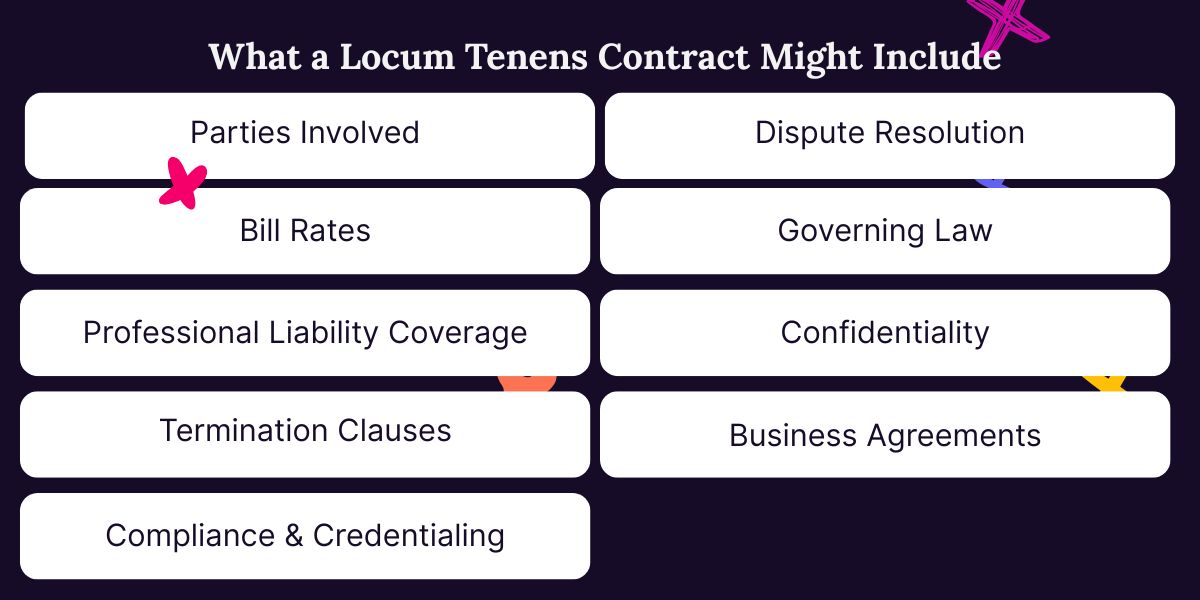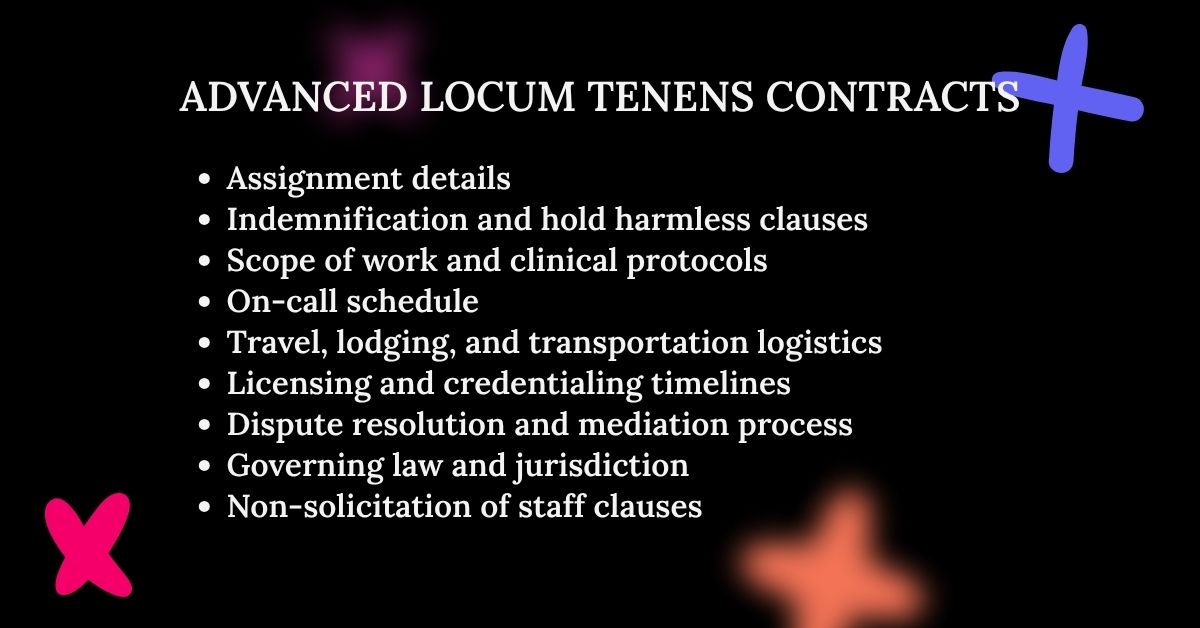Bringing in temporary physicians is essential for maintaining service lines and covering staffing gaps, and the fine print in your agreements holds the key to a successful and secure engagement. A well-structured contract protects your organization, ensures high-quality patient care, and builds a reliable pipeline of talent.
This advanced guide moves beyond the basics to explore the critical components and nuanced considerations of your locum tenens contracts. We will walk through everything from the essential elements of a master agreement to the strategic questions you should be asking during negotiation.
Our goal is to provide you with the insights needed to build stronger partnerships with staffing agencies, leading to smoother operations and more effective physician placements for your hospital.
What Is a Locum Tenens Master Agreement?
A master agreement in locums, also referred to as the locum tenens contract, is the foundation for your partnership with any locums doctor in your system. This document provides the essential legal framework for how you employ temporary physicians in general,. It can be written by the healthcare organization or by the locums agency used to recruit staff.
Signing a master agreement means you have approved the general terms of your relationship. Having a master agreement means that when your hospital needs a doctor to fill a sudden vacancy, you have already established important rules like insurance, how to resolve disagreements, and payment terms. This allows you to bring in a qualified professional quickly, which helps keep your services running smoothly for your patients and community.
What Basic Elements Make up a Locum Tenens Contract?
A well-written locum tenens contract is your best tool for a smooth and successful engagement. It protects your hospital and lays the groundwork for a positive partnership with the staffing agency. Whether you’re writing your own contract or evaluating one provided by an agency, every contract should comprehensively cover the following key areas:
- Parties Involved: The contract must clearly identify the full legal names of your hospital or health system, the locum tenens staffing agency, and the specific physician providing the services.
- Bill Rate Terms: Here, you will find the detailed financial arrangement between the locum tenens agency and the healthcare system. The bill rate is the amount the health system must pay the locums agency.
- Professional Liability Insurance: This is a critical component. The contract must explicitly state who provides the physician’s malpractice insurance and detail the type and amount of coverage. It should also clarify what happens, known as “tail coverage,” if a claim is filed after the assignment ends.
- Termination Clause: This clause defines the conditions under which the contract can be ended early. It should outline the required notice period for both your hospital and the agency to terminate without cause, as well as list any immediate reasons for termination with cause, such as loss of a medical license.
- Compliance and Credentialing: This section confirms that the physician holds an active, unrestricted license to practice in your state and is board certified if required. It should also verify that the agency has managed all primary source verification of the physician’s credentials, in line with your hospital’s medical staff bylaws.
- Dispute Resolution and Governing Law: To manage potential legal issues, the contract will specify which state’s laws will govern the agreement. It may also outline the required steps for resolving a dispute, such as mandatory mediation or arbitration, before any lawsuit can be filed.
- Confidentiality and Business Agreements: The physician should be bound by the same patient privacy rules, like HIPAA, as your permanent staff. The contract should also include clauses that protect your hospital’s business interests.
Having all these elements clearly defined in the contract ensures that your hospital is legally protected and allows the physician to focus on providing high-quality patient care from their very first day.

What Else Should We Consider in a Locum Tenens Agency Contract?
The foundation of a strong relationship with a locum tenens agency is the basic contract. Thinking through these operational details ahead of time will create a smoother experience for everyone, from your permanent staff to the patients. Some of these points will become formal parts of your agreement, while others are simply wise practices to plan for.
Here are some unique elements that you might find in a locum tenens contract:
- Assignment details
- Indemnification and hold harmless clauses
- Scope of work and clinical protocols
- On-call schedule
- Travel, lodging, and transportation logistics
- Licensing and credentialing timelines
- Dispute resolution and mediation process
- Governing law and jurisdiction
- Non-solicitation of staff clauses

Defining the Clinical Environment and Expectations
Before a physician arrives, it is wise to carefully consider the day-to-day reality of the role. You should have a clear idea of the expected patient volume and the complexity of cases they will handle. Be ready to outline the specific procedures they will need to perform and the schedule for any on-call duties. Having a detailed picture of the clinical environment allows the agency to match you with the right professional and helps the physician arrive prepared, which leads to better patient care from the very start.
Planning for On-the-Ground Support
A traveling physician will need your help to get oriented quickly. You should decide in advance what logistical support your hospital will provide. This can include arranging housing and transportation, though often your locums agency will handle that for you. In most cases, you want to focus on day-to-day support for the working physician. Assigning a point of contact who can help with everything from hospital credentials to accessing the electronic medical record system makes a significant difference. A physician who feels supported logistically can dedicate their full attention to patient care.
Understanding the Contractor Relationship
It is important for your leadership team to understand that a locum tenens physician is typically an independent contractor, not a hospital employee. This shapes the relationship in meaningful ways. While you provide general oversight and facility rules, the physician is responsible for their own clinical decisions. Acknowledging this professional independence from the beginning helps set the right expectations for your medical directors and administrative staff, fostering a more collaborative and respectful atmosphere.
Facilitating a Smooth Start and Finish
A well-managed transition protects patient safety and department morale. You should think through the entire lifecycle of the assignment. Consider what information and access the physician will need on their first day to be effective. Likewise, plan for their departure by ensuring a clear process for handing off patients, completing medical records, and returning hospital property. A thoughtful approach to these transitions minimizes disruption and maintains the high standard of care your community expects.
By considering these aspects as you build your partnership, you lay the groundwork for a productive and positive engagement that benefits your hospital long after the assignment is complete.
What Happens During Contract Negotiation?
Contract negotiation is an opportunity for you and the locum tenens agency to discuss and align your most important needs and concerns. The goal is to create a fair and clear agreement that protects your hospital while also being attractive to top-tier medical talent. This stage is where you move from general terms to a specific arrangement that works for your unique situation.
Perhaps the most common topic is the financial structure of the agreement. This is your opportunity to ensure the rates are competitive and fair. You will also discuss payment terms, such as the timeline for paying the agency. Beyond cost, negotiation covers operational details like the required notice for ending an assignment early. You may also discuss which state’s laws will govern the contract. These conversations help build a balanced relationship where both your hospital and the agency feel the terms are respectful and sustainable.
Ultimately, a successful negotiation ends with a contract that feels straightforward and fair. You should feel confident that the agreement supports high-quality patient care and provides a positive experience for the physician joining your team temporarily. A well-negotiated contract is the foundation for a reliable partnership you can count on for years to come.
Other FAQs About Locum Tenens Contracts
Even with a thorough contract, hospital executives often have specific questions about particular situations. Understanding these finer points can help you navigate potential challenges and further solidify your partnership with a staffing agency. Here are answers to some of the most common questions we encounter.
What Is a Name Clear?
A name clear occurs when a hospitals recruiting team confirms that they have not previously engaged a physician and therefore are agreeing to review them as a potential candidate. If they agree that this is not a candidate they are aware of (either though their own recruitment efforts or through perhaps another locums agency they use), then it means that should the hospital chose to work that provider, the hospital is obligated to pay the locums agency. This protects hospitals from paying locums fees for a physician they are already familiar with.
What Can Cause a Contract Termination?
A contract can end for two general reasons. The first is a termination without cause. This is when either your hospital or the agency decides to end the assignment for a reason that is not a breach of the agreement. The contract will specify how much advance notice, such as thirty days, is required for this.
The second reason is termination for cause. This is an immediate end to the contract for a serious issue. Causes can include the physician losing their medical license or DEA registration, professional misconduct, poor performance, criminal behavior, inadequate record keeping, or failing to maintain the required professional liability insurance. These clauses protect your hospital from being stuck in an unworkable situation.
Can a Locums Contract Contain a Non-Compete Clause?
This is a complex question. While a staffing agency might sometimes include a non-compete clause to protect its business, the enforceability of these clauses is often limited and varies significantly from state to state. Many states view them with skepticism, especially when they restrict a physician’s ability to work and earn a living.
Regardless of whether you choose to include a non-compete, focus on building a strong, positive relationship with the agency. This makes them your preferred partner for future needs, which may be a more sustainable solution than relying on a restrictive clause.
The Right Partner for Locums Staffing
Navigating the details of locum tenens contracts requires a partner who understands your need for both quality care and operational excellence. As your managed services provider (MSP), Syncx brings clarity and confidence to the entire process, from crafting ironclad master agreements to ensuring seamless onboarding for every physician.
Let’s partner to simplify your staffing, reduce administrative burdens, and secure the right talent for your facility. Contact us today for a personalized demo and see how Syncx can become your strategic ally in all things locums staffing.
